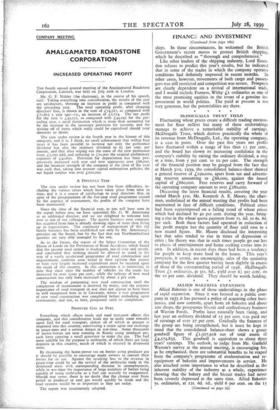COMPANY MEETING
AMALGAMATED ROADSTONE CORPORATION
INCREASED OPERATING PROFIT
THE fourth annual general meeting of the Amalgamated Roadstone Corporation, Limited, was held on July 2oth in London.
Mr. G. F. Nalder (the chairman), in the course of his speech, said: Taking everything into consideration, the results of the year are satisfactory, showing an increase in profit as compared with the preceding year. The total operating profit, after charging directors' fees, is shown in the sum of £74,527, as compared with £71,813 a year ago—i.e., an increase of £2,714. The net profit for the year is £43,551, as compared with £44,045 for the pre- ceding year, a small diminution which is more than accounted for by the increase in the necessary provision for taxation, and the writing off of items which really could be capitalised should your directors so desire.
The year under review is the fourth year in the history of this company, and it is, I think, no small achievement that within four years it has been possible to increase not only the preference dividend but also the ordinary dividend to 61 per cent, per annum, and that after wiping out the costs of the new preference issue, £5,700 odd, and reducing to £10,000 the original preliminary expenses of £40,800. Provision for depreciation has been pro- gressively increased each year and now aggregates over £66,000, and the financial strength of the company at the close of the year was such that, taking into account capital redemption policies, the net liquid surplus was over Doo,000.
A DIFFICULT YEAR The yeas under review has not- been free from difficulties, in- cluding the various crises which have taken place from time to time, and it is a source of satisfaction to your directors that, in spite of the postponement of the five-year road programme caused by the urgency of rearmament, the profits of the company have been maintained.
Since the dose of the financial year, as you will have seen in the report before you, we have appointed Mr. G. W. Armstrong as an additional director, and we are delighted to welcome him now as one of our colleagues. The quarry business your company has acquired from him is already showing signs of more than living up to expectations. The continuity of management of this old family business has been established not only by Mr. Armstrong's presence on the board, but by the fact that our Northumberland quarries are very ably managed by his son.
As to the future, the report of the Select Committee of the House of Lords on the Prevention of Road Accidents, which found that the present road system is inadequate, out-of-date and unsafe, and concluded that nothing should be allowed to stand in the way of a vastly accelerated programme of road construction and improvement, confirms your board in their opinion that sooner or later very largely increased expenditure must be incurred upon the roads of this country. In this connection it is interesting to note that since 1910 the number of vehicles on the roads has increased by over 2,000 per cent., while the mileage of new road construction has only been increased by about 2 per cent.
The wisdom of postponing new road construction until the completion of rearmament is doubted by many, and the extreme importance of road transport in war does not appear to have been so well recognised here as in Germany, where a vast programme of new road construction was completed before embarking upon rearmament, and not, as here, postponed until its completion.
PRODUCER GAS AS FUEL Everything which affects roads and road transport affects this company, and this consideration leads me to make some remarks upon fuel for road transport, almost all of which at present is imported into this country, constituting a strain upon our exchange in peace-time and a serious danger in war-time. Some thousands of motor-lorries are now running in Russia using producer gas, each lorry carrying a small generator to make the gas. The fuel most suitable for the purpose is anthracite, of which there are large deposits in this country, much of which is situated in distressed areas.
By decreasing the horse-power tax on lorries using producer gas it should be possible to encourage many owners to convert their lorries for its use. Against the resulting loss to the revenue in peace-time could be set the revival of the anthracite trade in the distressed areas with corresponding decrease in unemployment, while in war-time the importance of large numbers of lorries being capable of using anthracite as a fuel can scarcely be exaggerated. Should war come, there is no doubt that the change over from petrol to producer or coal gas would quickly be made and the road systems would be as important as they are today.
The report was unanimously adopted.








































 Previous page
Previous page